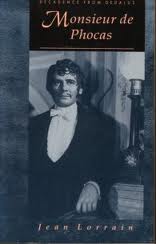| Home |
| Novels |
| Collections |
| Translations |
| Non-Fiction |
| Short Stories |
| Anthologies |

Cover by David Bird
Published by Dedalus in 1994
ISBN: 1 873982 15 1
Previous: The Angels of Perversity |
Next: Vampire City |
|
 |
Monsieur de Phocas ranks with A Rebours as the summation
of the French Decadent Movement. Modelled on The Picture of Dorian Gray,
it drips with evil and certainly would have been unpublishable in fin-de-siecle
England.
Cover by David Bird Published by Dedalus in 1994 |
Review by Glenn RussellIs not Jean Lorrain’s aristocratic aesthete, Monsieur de Phocas, the decadent precursor of our ravishing glamor stars, dressed to the nines, diamonds sparkling, forever striking a pose in the celebrity spotlight? Perhaps so, but then again, as compared with Monsieur de Phocas, which diamond-studded celebrity could express themselves with such colorful, lush, eloquent language when describing their glamorous, oh-so-special lives? By way of example, here is a diary entry where Phocas pens his reflections on a young exotic beauty: “And her eyes, what are her eyes like? Very beautiful -- eyes which have looked long upon the sea. Eyes which have looked long upon the sea! Oh, the dear and distant eyes of sailors; the salt-water eyes of Bretons; the still-water eyes of mariners; the well-water eyes of Celts; the dreaming and infinitely transparent eyes of those who dwell beside rivers and lakes; the eyes which one sometimes rediscovers in the mountains, in the Tyrol and in the Pyrenees . . . eyes in which there are skies, vast expanses, dawns and twilights contemplated at length upon the open seas, the mountains or the plains . . . eyes into which have passed, and in which remain, so many horizons! Have I not encountered such eyes already, in my dreams?” And Jean Lorrain’s novel can be seen as his own creative twist on Joris-Karl Huysmans’ 'À Rebours' (Against Nature). For example, similar to Huysmans’ main character, Des Esseintes, Monsieur de Phocas is nauseated by the modern, bourgeois, everyday cloth of humanity. Here are Phocas’ haughty, disdainful remarks whilst attending the theater: “The ugliness of that room, the ugliness of the whole audience! The costumes! The disgrace of that sheet-metal pomp which constitutes the ideal outfit of modern man: all those stove-pipes which enclose the legs, arms and torso of the clubman, who is strangled meanwhile by a collar of white porcelain. And the sadness: the greyness of all those faces, drained by the poor hygiene of city life and the abuse of alcohol; all the ravages of late nights and the anxieties of the rat race imprinted in nervous tics on all those fat and flabby faces . . . their pallor the colour of lard!” For lovers of that cult favorite, that jewel of decadent literature, 'À Rebours', Jean Lorrain's novel is a treasure. I enjoyed reading every single luscious page since, unlike Huysmans’ classic, Monsier de Phocas is written in intimate first-person and the aesthetic abode of Phocas isn’t a personalized and aestheticized retreat house but the entire city of Paris. And, of course, Phocas is the complete Decadent, suffering at various point from ennui (boredom), spleen (gloomy ire), impuissance (lack of energy) as well as intense highs and devastating lows fueled by opium and hashish, the exotic and the erotic, nightmares, masquerades, monsters and his association with a famous English painter of most peculiar temperament and murky disposition by the name of Claudius Ethal. We read: “That Claudius! When I am with that Englishman, I have the sensation of plunging into dirt and darkness: the tepid, flowing and suffocating more of my opium nightmare. When I listen to him the air becomes thick and his atrocious confidences stir up my basest instincts and dirtiest desires.” Lastly, as a special bonus, not only does this book published by Dedalus included a 15-page introduction on the life and times of Jean Lorrain but there is also a 8-page essay on the novel itself, both authored by Francis Amery aka Brian Stapleford. But, alas, I couldn’t conclude this review without one more quote from a novel bathed in the golden hues of Gustave Moreau, a novel written as if every sentence is meant to breath the poetry of Charles Baudelaire: “Black irises! It had to be black irises, and all that they implied, which greeted me on my return. Some unknown hand had caused these monstrous blooms to be distributed throughout the ground floor of my apartment in the Rue de Varenne. From the antechamber of the morning-room to the parlor every single room was beset by a disquieting flowering of darkness: a mute outburst of huge upstanding petals of greyish crêpe, like a host of bats set within the cups of flowers.” |
 |
The Brian Stableford Website |
 |